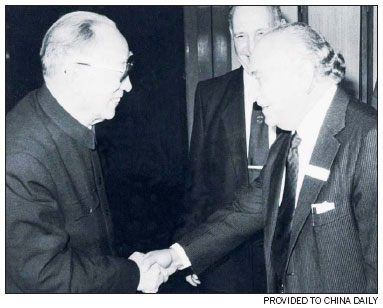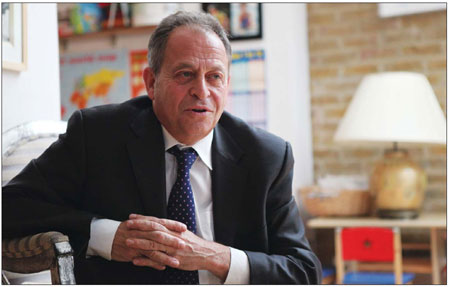Center
British family links China and West
Updated: 2010-12-03 13:11
(China Daily European Weekly)

 |
|
Top: Jack Perry meets senior Chinese leader Bo Yibo in |
Father-and-son team bridged Chinese business with West.
When you visit Englishman Stephen Perry's home, expect to be offered Chinese tea. The choice is a delectable reflection of the deep ties that the 62-year-old and his family have with China. Perry is the chairman of the 48 Group Club, an independent business network committed to promoting positive links with China. Together with his father Jack, he is part of a select group of people who played a major role in breaking the ice over China's trade with Britain and the United States.
As early as the 1950s, the elder Perry was one of the first Britons to do business with the mainland after the founding of New China.
Taking over the baton, Stephen Perry later helped New China reach its first major business deal with the US; bring the first English soccer team to the country, and introduce Andrew Lloyd Webber's musicals to the Great Hall of the People. "It was a mission for me, like my father," says Perry in his house next to Regent's Park in central London.
It was in 1952 when Jack Perry gave up his business and traveled to China for trade, at a time when the Cold War threatened world peace.
"The days after the creation of the People's Republic of China were marked by a resistance in the West to accepting it. Those who believed in trade and interdependence, like my father, were in a minority in the West," Stephen says, adding that his father Jack encountered "great resistance from many quarters".
Jack Perry's trip to China was tough. It took a team of 48 people, who formed the precursor of the 48 Group Club, seven days to fly to Hong Kong in July 1952, when Americans "were trying hard to stop people going to China". The team overcame the hurdle with the help of then premier Zhou Enlai's emissary. They spent three days getting to Beijing and saw "terrible poverty and malnutrition".
Struggling to emerge from the predicament, China then imported "very basic things to start a country" from the Perrys. Beijing bought items ranging from grain and copper to machines and medicines.
But as the family business grew, its ties with the West floundered. Many people back home threatened him and local newspapers even called Jack and his peers "the Communist Reds".
The family's ties with the US also broke down. Their firm was banned from doing business with the US during 1956-71 and Stephen Perry even needed a visa to visit the US.
"The first time I went to the American embassy, they told me to be careful of what I wrote," says Perry, who was a leftist student leader when he studied law at University College London. "I read about Marxism, Leninism and Mao Zedong thoughts more than law books."
But the Americans who opposed the Perrys never expected that they would one day need their help to get in touch with China.
One day in 1968, Jack asked his son, who was still in college, to go to his office to meet two Americans who claimed to be from a mid-west cattle company. They were discussing with how to sell cattle and meat to China and asked a lot of questions.
"I said to my father after the meeting: 'That's an interesting business opportunity."
"Who do you think they are?" his father asked.
"A mid-western cattle company."
"No, no, no, they are the CIA. "
"What are they doing here?"
"They want to understand China. Something is going on," Jack Perry said.
Four years later in 1972, the father and son boarded a plane to China. It was the younger Perry's first trip to the country.
Traveling from Beijing down to Guangdong province, Stephen experienced a China that was different from his expectations. He saw poverty and the hard life of the peasants. People there were not interested in trade unions or student activities, he says.
But there were people "spending a lot of time talking, philosophically, on what was the right way to go. I was very impressed", Perry says.
After attending that year's Canton trade fair, Stephen turned to the US to finalize the export of 150 tons of polyester to China - a pioneering trade at the time. As the US did not have the adequate experience to trade with China then, the Perrys "had to teach the Americans" everything, including how to pack their goods.
"We needed to find shipping companies, we needed to find the ports. And the first goods were shipped out of Charleston Harbor (on the US east coast)," Perry recalls.
The Perrys later appeared in Washington to meet Henry Kissinger, then national security advisor for former president Richard Nixon, and his staff. "They asked lots and lots of questions about China. My father helped them understand China in the early days," Perry says. "A young staffer of Kissinger said: 'Please, Mr Perry, we want to know how the Chinese feel about us'."
Built on this initial success, the family expanded trade between Washington and Beijing. "Then I started to sell Chinese cashmere, Chinese leather, Chinese porcelain, Chinese vodka to the US market from 1972 onwards."
In 1977, they sold 10,000 tons of American polyester to China. "I never thought it as business I was lucky to have a place in history to help create the connection between China and America," Perry says.
Following the end of the "cultural revolution" (1966-76) and the introduction of the reform and opening-up policy, the family managed to break more ice in Sino-British exchanges.
Perry brought West Bromwich Albion football club to Beijing to take on the "China Eleven" on Aug 1, 1979, making the Premiership side the first English team in China. But it was only 25 years later that he found out late leader Deng Xiaoping was sitting in the stadium that day.
About two decades after the match, Perry helped bring British musicals by Andrew Lloyd Webber to China.
"Taking Western shows to China was very complicated," he says. Webber's team asked him, "Are you mad?" when he said he wanted to get the show into the Great Hall of the People, he recalls. "I said, 'yes'. But if we can't get your shows into the Great Hall of the People, let's forget about the rest," he replied.
Perry went to China and spoke to Li Yuanchao about the idea. Stephen said he thought Li, then deputy culture minister, forwarded his idea to Wu Yi, then a state councilor and great fan of Webber's shows.
Jesus Christ Superstar performed in Beijing 2001. After the success of the musical, Perry brought more of Webber's shows, such as Cats and Phantom of the Opera to China.
Perry says he never thought his family's China stories were just about business alone.
"I thought I was fortunate to see this as an unfolding experience of bringing a world back together ... I firmly believe in the concept of interdependence.
"When there's more interdependence, there's more chance for peace and prosperity. For me, that is a mission in life."
E-paper

Ear We Go
China and the world set to embrace the merciful, peaceful year of rabbit
Preview of the coming issue
Carrefour finds the going tough in China
Maid to Order
Specials

Mysteries written in blood
Historical records and Caucasian features of locals suggest link with Roman Empire.

Winning Charm
Coastal Yantai banks on little things that matter to grow

New rules to hit property market
The State Council launched a new round of measures to rein in property prices.
